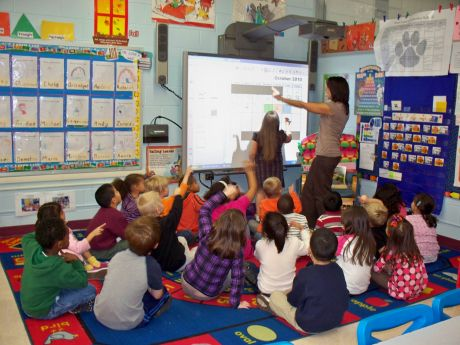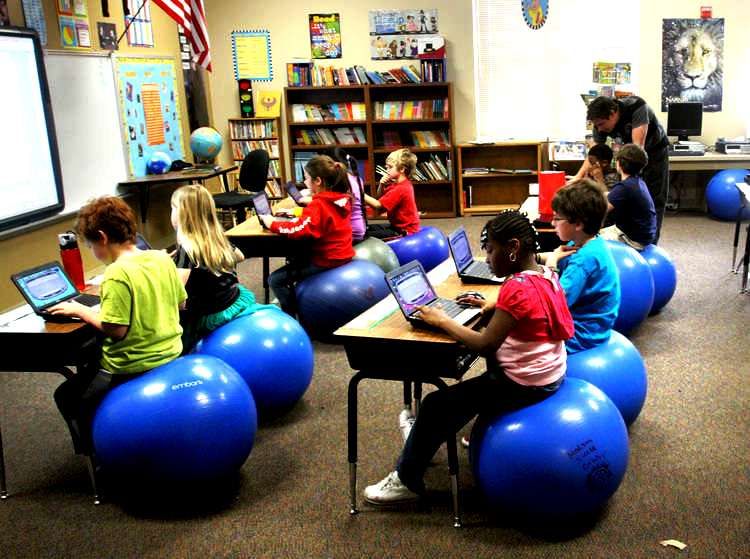What can we learn from Sir Ken Robinson?
Changing Education Paradigms by Kaitlyn Parker
Sir Ken Robinson is a creativity expert. His video "Changing Education Paradigms" was a very interesting and controversial video. In the video, Sir Ken Robinson talks mainly about three things; attention deficit hyperactive disorder or ADHD, rising dropout rates, and schools' dwindling stake in the arts. He begins by talking about ADHD. He believes that America is drugging children and saying children have ADHD when most do not. I think he proves a good point. He says we surround our children with computers, iPhones, TV and much more and expect them to go to school and pay attention to the boring stuff. Then, when they do not pay attention in class we assume it is ADHD and automatically put them on prescription drugs for it. According to him people start losing interest and ADHD is more common as you move east across the country. The southern states that surround Alabama are some of these. He calls it a "fictitious epidemic".
One thing he says that stuck out to me is that we all have the capacity to be a "genius", but as we age it deteriorates. We have the ability to change even though society has made it this way. We have been told all our school age lives, that the answers are in the back of the book and things of this nature. So because of this we stop challenging ourselves as we age and instead of our intelligence growing, it shrinks. He talks about a study where they took a set of children. Every five years they tested the same children and each time they did their scores were lower than the time before. Another thing he discusses is how most great learning happens in groups and collaboration is great.
I think we can learn from Sir Ken Robinson. We can learn from him to keep our students engaged and be creative in the ways we do this. Creativity and art are great ways to keep children entertained in the classroom. We should discourage the use of ADHD medication and students dropping out of school. We need to encourage our students to grow and want to become better learners.
We can learn a lot from him because he shows a different views on problems that our students may face. My eyes are now open to how often ADHD is diagnosed in my area, as well as surrounding states. Sir Ken Robinson pointed out great facts on how it may not always be the correct diagnosis. He showed me that medication is not always the right prescription for someone with ADHD. Maybe that child could benefit from less time spent in front of games and television and more time spent in a classroom where a teacher engages his or her students with creative project based learning.
The Importance of Creativity by
Paula Lu
Sir Ken Robinson is a creativity expert. He challenges the way we are educating our children. In his TED Talks lecture “The Importance of Creativity,” he discusses how education is killing creativity. He believes creativity is as important as literacy. He says that in this generation, children are frightened of being wrong and we are the cause of that. It is also the reason that school kills creativity. He says, “If you are not prepared to be wrong, you will never come up with anything original.”
I completely agree. Kids are scared of being wrong. I am scared of being wrong. All through middle school and high school, I never spoke a word or answered a question because I was always afraid of being wrong. Though that did not stop my creativity, I understand how important creativity can be. For me, art was an outlet. I could not be “wrong” in creativity. Everything that I created or drew was made for me, myself, and I. No one could tell me that I did something wrong. Since creativity is such a big part of me, I want it to be a big part of my future classroom.
Sir Ken Robinson says that we grow out of creativity. In his lecture he quoted Picasso, “All children are born artists. The problem is to remain an artist as we grow up.,” and its true. School really does kill creativity and what is worse is the further you get in education, the creativity dies more and more. There is a big difference on how elementary kids are taught compared to college students. Bette Fetter says “Schools are producing test takers, while businesses need thinkers and innovators.”
Sir Ken Robinson says that everywhere you go, art is on the bottom of what I would call the “education food chain.” Which is completely true. When a school is low on funds, what is the subject that gets thrown out first? The arts. Why is that? I understand the importance of Math and Language, but I think art is important too. Why is it that education can not be fun? Why is it so serious. I do not learn that way. Kids do not learn that way. Who really benefits from school?
Sir Ken Robinson has many interesting points and I agree with him completely. I did not realize until now, but this is the reason I wanted to become an educator; to make learning fun.
How to Escape Education's Death Valley by
Haley Torries
Ken Robinson: How to Escape education's death valley is a discussion about the problems with our educational system. Ken Robinson was told that Americans do not understand irony. When he arrived in America 12 years ago, he found out that this is not the case. He knew Americans understood irony when he heard about the legislation "No Child Left Behind". He said this is irony because 60% of children drop out of high school. This does not count the children who are in school and do not enjoy or benefit from it. The United States spend enough money on education and Mr. Robinson believes we are headed in the wrong direction. He stated that we are stuck in believing that teachers must labor and students have to endure.
Mr. Robinson says that the three principles that human life flourishes under is diversity, curiosity and creativity. "No Child Left Behind" is based on conformity and not diversity. This only allows us to find out what kids can do based on a narrow spectrum. This legislation focuses mostly on the standards, which is important but not the only things children need to learn. A well rounded education deals with arts, humanities, physical education and the standards. Over 10% of children are diagnosed with ADHD. Mr. Robinson believes too many children are labeled with this diagnosis that do not suffer from ADHD. If you sit any child down for hours to do work, most will start to get antsy. Arts are important because they deal with parts of children that normally would not be touched otherwise and keep children from building up energy.
Children naturally want to learn. Curiosity allows the child to learn. If a child is interested in learning a subject, then their natural curiosity will foster learning. Curiosity is the engine of achievement. Teachers are what keeps the schools going. Teaching is a creative profession which is achieved by mentally stimulating, provoking and engaging students. Educators, parents, legislators and society should discuss learning rather than education. If learning is not taking place, then there is no education. Standardized testing is important but should not be the main goal of education. These test should support learning, not obstruct it. Instead of encouraging curiosity from our students, America is encouraging compliance with our standardized test.
Humans are naturally creative and unique. People create the lives they chose to live. When people do not like the life they have created for themselves, then they recreate it. We should encourage our students to be creative and different. America has become a culture of standardization.
Death Valley is a very hot place in America where plants rarely grow. This is because it rarely rains. During the winter of 2004, it rained seven inches. Therefore in the Spring of 2005, there were flowers covering the floor of death valley. The flowers eventually died from lack of water. This proves that Death Valley is not dead, just dormant. This is the same with education, it is not dead but just needs some climate control.
My opinion is that students should be encouraged to stay active rather than given medicine for wanting to be active. Medication should be a last resort to a child being overly active. I agree with Ken Robinson's views on education. We should be encouraging learning rather than just education. "No Child Left Behind" focuses on keeping children all at one level. We, educators and society, should encourage children to exceed the standard level of education and focus on advanced learning.
 My dream classroom that I wrote about in blog post #1 and my dream classroom now are still very similar, but differ in a few ways. I still want to use SMART boards and iPads but now I would also like to incorporate blogging, Skype, and podcasts into my classroom. These were things that I did not know existed at the time when I wrote my first blog post. I have now learned about many other types of technology that are used in classrooms today; even elementary classrooms. At the beginning of this course I did not know that elementary students had or knew how to use so much technology. It amazed me! I want to use technology in my classroom to help my students grow and learn. I also want to use Project Based Learning or PBL in my classroom. Throughout my EDM310 semester I have realized the importance of Project Based Learning and how greatly it can impact a students learning. I think PBL is great for students of all ages but especially good for elementary students. It is a great way to keep young students engaged and interested in school and the lesson being taught. With PBL students learn the lesson from the project instead of learning a lesson and then doing a project or test at the end. I also want to try out flipping the classroom and see how that works for me and my students.
My dream classroom that I wrote about in blog post #1 and my dream classroom now are still very similar, but differ in a few ways. I still want to use SMART boards and iPads but now I would also like to incorporate blogging, Skype, and podcasts into my classroom. These were things that I did not know existed at the time when I wrote my first blog post. I have now learned about many other types of technology that are used in classrooms today; even elementary classrooms. At the beginning of this course I did not know that elementary students had or knew how to use so much technology. It amazed me! I want to use technology in my classroom to help my students grow and learn. I also want to use Project Based Learning or PBL in my classroom. Throughout my EDM310 semester I have realized the importance of Project Based Learning and how greatly it can impact a students learning. I think PBL is great for students of all ages but especially good for elementary students. It is a great way to keep young students engaged and interested in school and the lesson being taught. With PBL students learn the lesson from the project instead of learning a lesson and then doing a project or test at the end. I also want to try out flipping the classroom and see how that works for me and my students.






